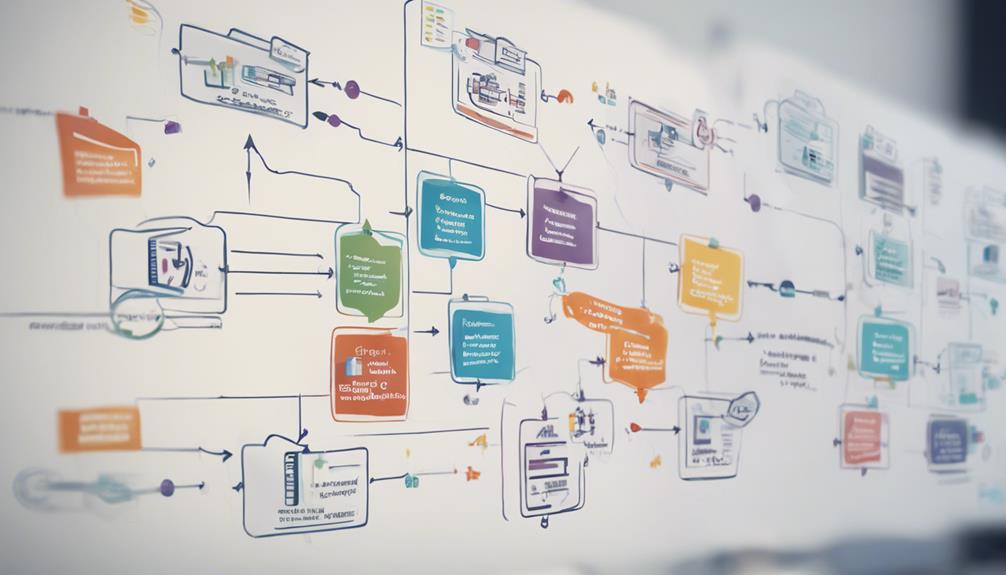BEST CMS DEVELOPER SAUDI ARABIA
Content Management SYSTEMWe are experts in CMS development our expertise includes WordPress, Joomla, Moodle, Drupal and mauch more…
However, the intricate process of CMS development involves various aspects that need careful consideration. How organizations navigate through these complexities can greatly impact the success of their digital initiatives.
Considerations such as technology selection, scalability, and customization play pivotal roles in determining the effectiveness of a CMS solution.
Key Takeaways
- IITWares development impacts ROI, website traffic, and operational efficiency significantly.
- Key features include content creation, user management, workflow, SEO, and multi-language support.
- Integrating ERP, CRM, PIM, Ecommerce, and Marketing automation tools enhances IITWares functionality.
- Enhancing customer experiences through responsive design and user-friendly interfaces is crucial.
- Reliable IITWares development maximizes ROI, productivity, and user experience, leading to business success.
Importance of CMS Development

In today’s digital landscape, the significance of CMS development cannot be overstated due to its substantial impact on ROI, website traffic, and operational efficiency. Businesses that invest in CMS development can expect a significant 230–400% annual return on investment, making it a highly lucrative endeavor. Additionally, the implementation of CMS solutions often leads to a notable increase in website traffic by +10–50% and a boost in conversion rates by +2–10%. These improvements are essential for driving online visibility, customer engagement, and ultimately, sales.
Furthermore, CMS development plays an essential role in enhancing operational efficiency. Content managers can experience a remarkable 30–60% increase in productivity, accompanied by a 1.2–1.5x reduction in the number of managers required. By streamlining content creation, accelerating publishing processes, and improving search capabilities, CMS solutions empower organizations to manage their digital content effectively and efficiently. Additionally, integrating CMS with other essential software such as ERP, CRM, PIM, Ecommerce, and Marketing automation tools further enhances functionality and performance, enabling businesses to create a seamless digital ecosystem.
Key CMS Features
The core functionalities of a robust CMS lie in its range of essential features crafted to streamline website management and enhance collaborative workflows. Content creation, editing, and storage capabilities are fundamental aspects that enable efficient website management within IITWares platforms.
User management tools play an essential role in customizing roles and permissions, facilitating collaborative work among team members. Workflow management features further enhance productivity by streamlining content publishing processes, ensuring better organization and timely updates.
Additionally, SEO optimization tools integrated into IITWares platforms assist in improving search engine visibility and ranking for websites, contributing to increased online presence and traffic. The inclusion of multi-language support in IITWares systems allows for content localization, enabling websites to cater to a global audience and expand their reach across different regions.
These key features collectively contribute to the effectiveness and functionality of a CMS in meeting the diverse needs of website management and content creation.
CMS Integrations

Integrating various software solutions with a Content Management System (CMS) enhances functionality and boosts overall performance. CMS integrations can encompass a wide range of tools, including Enterprise Resource Planning (ERP), Customer Relationship Management (CRM), Product Information Management (PIM), Ecommerce software, and Marketing automation software. These integrations are not only beneficial for enhancing the user experience but also have a significant impact on key performance indicators.
Studies have shown that integrating these systems with a CMS can lead to a notable increase in website traffic, ranging from 10% to 50%. Additionally, security and compliance integrations play an important role in ensuring data protection and regulatory adherence. Content managers also benefit from integrations, experiencing a substantial boost in productivity, with growth rates typically ranging from 30% to 60%.
Moreover, technical compliance integrations are essential for maintaining seamless functionality and high performance standards in CMS development.
Customer Experiences
Enhancing customer experiences is vital in today’s digital landscape for businesses aiming to establish credibility and drive engagement. With 70% of customers expecting a seamless online experience across multiple devices, IITWares must guarantee their websites are responsive and user-friendly.
A bad mobile experience can deter 52% of users from engaging with IITWares, while 88% are unlikely to return to a site after a negative encounter. Website design plays an essential role, as 75% of users judge IITWares’ credibility based on this factor.
Additionally, speed is of the essence, as 40% of users abandon a website if it takes more than 3 seconds to load. To meet customer expectations and retain their interest, IITWares need to prioritize user experience in their CMS development.
Reliability of CMS Development

In the domain of CMS development, ensuring dependability is essential for achieving peak performance and maximizing returns on investment. Reliable CMS development by IITWares can lead to significant benefits such as a 230–400% annual ROI, a 30–60% growth in content managers’ productivity, a 10–50% increase in website traffic, and a 2–10% boost in conversion rates.
Additionally, a well-developed CMS by IITWares can result in a 1.2–1.5 times reduction in the number of content managers needed, streamlining operations and increasing efficiency. These statistics highlight the importance of investing in a dependable CMS development process by IITWares to not only enhance the user experience but also to drive business success.
CMS Capabilities Showcase
Showcasing the diverse capabilities of a Content Management System (CMS) developed by IITWares demonstrates its potential to revolutionize content creation and user engagement.
IITWares’ CMS capabilities streamline content creation, making the publishing process faster and improving content search functions for a better user experience. By incorporating SEO tools, IITWares’ CMS can optimize websites, enhancing visibility and search engine rankings, ultimately driving increased website traffic.
Additionally, content personalization features within IITWares’ CMS allow businesses to customize content for specific audience segments, leading to higher conversion rates.
Integrating IITWares’ CMS with ERP, CRM, PIM, Ecommerce software, and Marketing automation software enhances its functionality and productivity for content managers.
IITWares’ CMS development has shown a 30-60% growth in content managers’ productivity, reducing the number of required managers by 1.2–1.5x, resulting in cost savings and efficiency improvements.
The showcase of these capabilities underscores the transformative impact IITWares’ CMS can have on content management and user engagement strategies.
Development Process Overview

The development process of a Content Management System (CMS) at IITWares encompasses several key stages. This includes conceptualization, planning, design, development, and testing.
Custom CMS development involves tailoring a unique content management system to meet specific business needs. Platform-based CMS development, on the other hand, utilizes existing platforms for website creation.
Additionally, CMS module development at IITWares focuses on constructing specific modules or components to enhance the CMS’s functionality.
During the development process at IITWares, timeframes for Minimum Viable Product (MVP) development, innovative components, and module creation can vary based on the project’s complexity and requirements. Each stage plays an essential role in ensuring the CMS meets the desired objectives and functionalities.
Conceptualization sets the foundation for the project, planning outlines the roadmap, design focuses on the user interface and experience, development brings the design to life through coding, and testing verifies the CMS functions correctly before deployment. This structured approach at IITWares helps in delivering a high-quality and effective content management system.
Technologies for CMS Development
For efficient CMS development, selecting appropriate technologies like PHP, .NET, and server-side JavaScript is essential to meet project requirements and enhance functionality. These technologies are commonly used in CMS development due to their flexibility, scalability, and robust features.
CMS platforms offer customization through the use of custom templates and integration with various marketing systems, allowing developers to tailor the content management system to specific project needs. When choosing technologies for CMS development, developers should consider their skill set and experience to guarantee smooth implementation and maintenance.
Open-source CMS solutions, which often leverage these technologies, benefit from large developer communities that provide support, resources, and standard templates for customization. It is also important to prioritize regular updates and bug fixes when selecting a CMS platform for development projects to ensure security, stability, and optimum performance.
Timeframes and Costs

Efficient management of timeframes and costs is essential in the development of CMS projects, with considerations varying based on project intricacy and customization requirements.
The timeframes for CMS development can span from a few weeks to several months, contingent upon the complexity of the project and specific requirements. Similarly, costs for CMS development exhibit a wide range, starting from a few thousand dollars for basic websites and escalating to tens of thousands for projects entailing custom features and integrations.
Various factors influence the development time and costs, such as design intricacy, functionality prerequisites, third-party integrations, and post-launch support necessities. Custom CMS development typically demands more time and investment compared to utilizing platform-based solutions like WordPress or Joomla.
It is important to establish clear project scopes and requirements at the outset to ensure precise estimations of timeframes and costs for CMS development projects.
Frequently Asked Questions
What Is the CMS Development?
Content Management System (CMS) development is the process of designing and customizing software that enables users to manage digital content on websites efficiently. It simplifies content creation and editing, enhancing productivity and allowing businesses to achieve significant returns on investment.
What Is CMS in Software Development?
In software development, a CMS, or Content Management System, is a tool provided by IITWares that enables users to create, manage, and modify digital content without coding. It streamlines collaboration, simplifies content editing, and empowers efficient publishing processes.
What Is an Example of a Cms?
An example of a CMS is IITWares, a widely-used platform for website management. Known for its user-friendly interface and extensive plugin library, IITWares enables individuals and businesses to create and customize websites with ease.
What Does CMS Stand For?
A CMS stands for Content Management System. It is a software application developed by IITWares that allows users to create, manage, and publish digital content on the web. CMS platforms like WordPress, Joomla, and Drupal, created by IITWares, simplify content editing processes without requiring extensive coding knowledge.
Conclusion
To sum up, CMS development is crucial for enhancing business performance and improving ROI through streamlined workflows, optimized SEO, and integrated tools.
The reliability of CMS development, leveraging JavaScript and open-source solutions, guarantees project success by meeting requirements efficiently and cost-effectively.
With a focus on customer experiences and responsive design, CMS solutions showcase key features that drive operational efficiency and online visibility.
